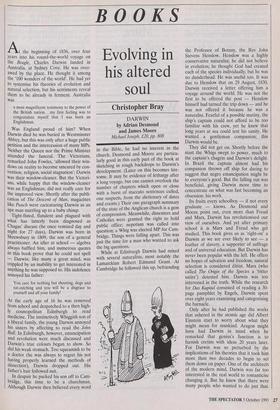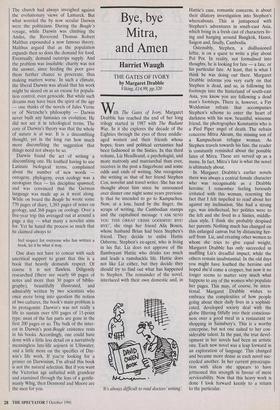BOOKS
Evolving in his altered soul
Christopher Bray
DARWIN by Adrian Desmond and James Moore Michael Joseph, £20, pp. 808 At the beginning of 1836, over four years into his round-the-world voyage on the Beagle, Charles Darwin landed in Australia, at Sydney Cove. He was over- awed by the place. He thought it among the '100 wonders of the world'. He had yet to systemise his theories of evolution and natural selection, but his sentiments reveal them to be already in ferment. Australia was a most magnificent testimony to the power of the British nation. ..my first feeling was to congratulate myself that I was born an Englishman.
Was England proud of him? When Darwin died he was buried in Westminster Abbey, but this was only after a huge public petition and the intercession of many MPs. Neither the Queen nor the Prime Minister attended the funeral. The Victorians, remarked John Fowles, 'allowed their win- dows on reality to become smeared by con- vention, religion, social stagnation'; Darwin was their window-cleaner. But the Victori- ans, while happy that the window-cleaner was an Englishman, did not really care for the improved view. Shortly after the publi- cation of The Descent of Man, magazines like Punch were caricaturing Darwin as an ape man nuzzling up to a baby chimp.
Tight-fisted, flatulent and plagued with What has latterly been diagnosed as Chagas' disease (he once vomited day and night for 27 days), Darwin was born in Shrewsbury in 1809, the son of a general practitioner. An idler at school — algebra always baffled him, and numerous quotes in this book prove that he could not spell — Darwin, like many a great mind, was crippled by an inability to get interested in anything he was supposed to. His indolence annoyed his father:
You care for nothing but shooting, dogs and rat-catching and you will be a disgrace to yourself and all your family!
At the early age of 16 he was removed from school and despatched to a then high- ly cosmopolitan Edinburgh to read medicine. The instinctively Whiggish son of a liberal family, the young Darwin annoyed his sisters by affecting to read the John Bull. In Edinburgh, however, emancipation and revolution were much discussed and Darwin's true colours began to show. So did his weak stomach. Too squeamish to be a doctor (he was always to regret his not having properly learned the methods of dissection), Darwin dropped out. His father's hair followed suit.
In despair he packed his son off to Cam- bridge, this time to be a churchman. Although Darwin then believed every word in the Bible, he had no interest in the church. Desmond and Moore are particu- larly good in this early part of the book at sketching in rough backdrops to Darwin's development. (Later on this becomes tire- some. It may be evidence of lethargy after a long voyage, but one cannot overlook the number of chapters which open or close with a burst of staccato sentences culled, one suspects, from the dictionary of dates and events.) Their one paragraph summary of the state of the Anglican church is a gem of compression. Meanwhile, dissenters and Catholics were granted the right to hold public office; nepotism was called into question; a Whig was elected MP for Cam- bridge. Things were falling apart. This was just the time for a man who wanted to ask the big questions. While at Edinburgh Darwin had mixed with several naturalists, most notably the Lamarckian Robert Edmund Grant. At Cambridge he followed this up, befriending the Professor of Botany, the Rev John Stevens Henslow. Henslow was a highly conservative naturalist; he did not believe in evolution; he thought God had created each of the species individually; but he was no dunderhead. He was useful too. It was due to Henslow that on 29 August, 1830, Darwin received a letter offering him a voyage around the world. He was not the first to be offered the post — Henslow himself had turned the trip down — and he was not offered it because he was a naturalist. Fearful of a possible mutiny, the ship's captain could not afford to be too familiar with his crew, yet he knew that long years at sea could test his sanity. He wanted a gentleman companion; this Darwin would be.
They did not get on. Shortly before the mast the Whigs swept to power, much to the captain's chagrin and Darwin's delight. In Brazil the captain almost had his companion thrown off ship for daring to suggest that negro emancipation might be to everyone's good. But the falling out was beneficial, giving Darwin more time to concentrate on what was fast becoming an obsession: his work.
Its fruits every schoolboy — if not every graduate — knows. As Desmond and Moore point out, even more than Freud and Marx, Darwin has revolutionised our view of ourselves. And yet after primary school it is Marx and Freud who get studied. This book gives us as 'right-on' a Darwin as we are ever likely to see — a loather of slavery, a supporter of suffrage and of universal education. But Darwin has never been popular with the left. He offers no hopes of salvation and freedom; natural selection is considered elitist. Marx (who called The Origin of the Species a 'bitter Satire') detested him. Darwin was too interested in the truth. While the research for Das Kapital consisted of reading a 30- page pamphlet by Engels, Darwin spent over eight years examining and categorising the barnacle.
Only after he had published the works that ushered in the atomic age did Albert Einstein start to worry about what they might mean for mankind. Aragon might have had Darwin in mind when he remarked that genius's function is to furnish cretins with ideas 20 years later. For Darwin was so perturbed by the implications of his theories that it took him more than two decades to begin to set them down on paper. One of the architects of the modern mind, Darwin was far too interested in the real world to romanticise changing it. But he knew that there were many people who wanted to do just that.
The church had always inveighed against the evolutionary views of Lamarck. But what worried the by now secular Darwin were the politicians. During the Beagle's voyage, while Darwin was climbing the Andes, the Reverend Thomas Robert Malthus expounded a now famous theory. Malthus argued that as the population expands then so does the demand for food. Eventually, demand outstrips supply. And the problem was insoluble: charity was not the answer, since feeding the poor gave them further chance to procreate, thus making matters worse. In such a climate, the liberal Darwin was afraid that his work might be siezed on as an excuse for popula- tion control, even genocide. But while such dreams may have been the spirit of the age — one thinks of the novels of Jules Verne or of Nietzsche's philosophy — Darwin never built any fantasies on evolution. He did not see it in teleological terms. The core of Darwin's theory was that the whole of nature is at war. It is a discomfiting thought, yet in the long run how much more discomfiting the suggestion that things need not always be so.
Darwin found the act of writing a discomfiting one. He loathed having to use Latinate biological terms, complained about the number of new words — ontogeny, phylogeny, even ecology was a neologism then — his discipline spawned, and was convinced that the German language was made up as it went along. While on board the Beagle he wrote some 770 pages of diary, 1,383 pages of notes on geology, and 368 pages on zoology. Over a five-year trip this averaged out at around a page a day.— what many a novelist aims for. Yet he hated the process so much that he claimed always to
feel respect for everyone who has written a book, let it be what it may.
One does not have to concur with such uncritical support to grant that this is a book that heavily demands respect. Of course it is not flawless. Diligently researched (there are nearly 60 pages of notes and more than 30 pages of biblio- graphy), beautifully illustrated, and admirably written by two scientists who once more bring into question the notion of two cultures, the book's main problem is its protagonist: Darwin's was not really a life to sustain over 650 pages of 11-point type; most of the fun parts are gone in the first 200 pages or so. The bulk of the inter- est in Darwin's post-Beagle existence rests in his books. Accordingly, one could have done with a little less detail on a narratively meaningless late-life sojourn in Ullswater, and a little more on the specifics of Dar- win's life work. If you're looking for a primer on Darwinism, I'm afraid this book is not the natural selection. But if you want the Victorian age unfurled with grandeur and examined through the lens of a gentle- manly Whig, then Desmond and Moore are the men for you.



















































 Previous page
Previous page